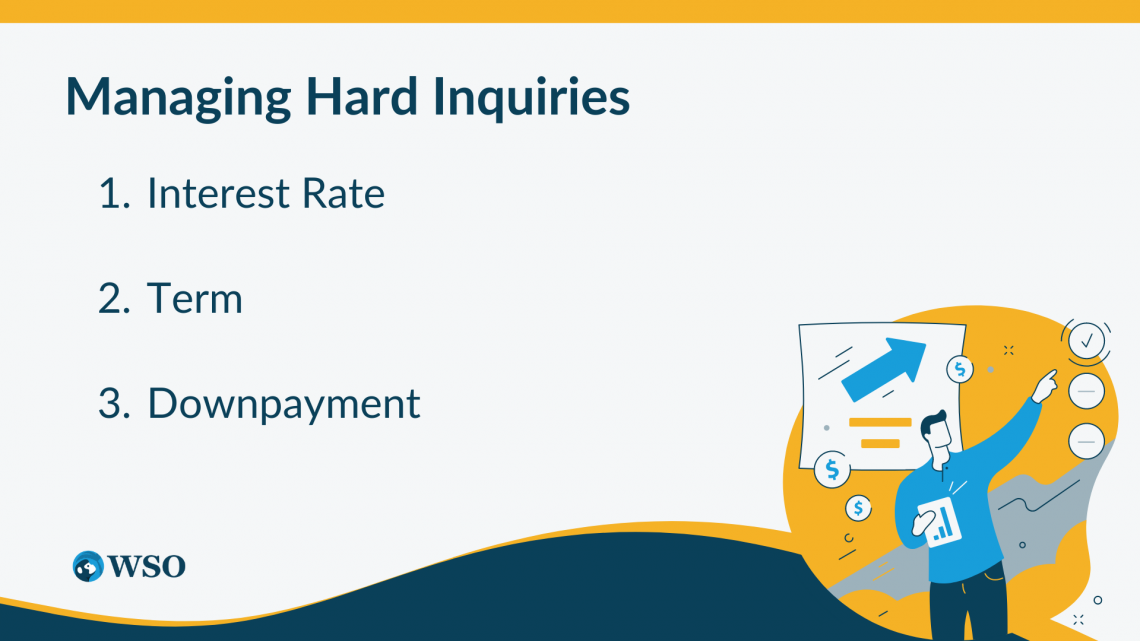Hard Inquiry
Hard Inquiries happen whenever you apply for a loan
Have you ever worried about checking your credit score? Most people fear that checking your credit score will lower it. This, in fact, isn’t true. When checking your credit score, you make an “inquiry”. Inquires will not affect your credit score as they are considered “soft”.

Unfortunately, some inquiries do affect your credit score. These are considered hard inquiries, and they can lower your credit score. When lenders apply for a loan, they look at your credit history and other financial statements. This check is listed as an inquiry on your credit report.
These inquiries represent every time you take out a new loan or apply for another type of credit/debt. This can affect your chances of acquiring a loan as banks see inquiries as a sign of insecurity in your financial life.
Although these hard inquiries happen during some of the most important financial decisions, you aren’t limited to only one. When applying for loans, the multiple inquiries are counted as one and don’t affect your credit score significantly.
Key Takeaways
- Hard Inquiries are when banks or credit institutions check your credit history.
- Hard inquiries are when someone else checks your credit, while soft inquiries are when you check your credit score.
- Checking your credit history doesn’t affect your credit score.
- Hard Inquiries happen whenever you apply for a loan.
- If you get multiple inquiries within a 15-day window, they will be counted as one inquiry.
Multiple Inquiries
When looking around for mortgages, it's impossible not to apply to multiple loans and multiple banks. Each bank and each loan has its different terms and conditions. When shopping around for a mortgage, it's important to see which loan will give you the best benefits.

The credit bureau is well aware of this. Therefore they won’t penalize you for shopping for loans. Especially for mortgages and auto loans. After applying for a loan, you'll be given a 15 to 45-day grace period (depending on the borrower and loan) to apply for other loans.
All loans applied for within this period will be listed under one inquiry. Your credit history will record all the loans you applied for, but the loans get penalized under one hard inquiry.
Although this one inquiry can affect your credit score, the effect will only generally last for 1 year. The inquiry may last around 2 years on your report, but your credit score will recover quickly as long as you’re paying off your loans.
Regardless of the effect hard inquiries have, being able to look at multiple loans and their benefits is a great tool that every future homeowner should use. The ability to look at multiple possibilities gives homeowners the best possible loan they can take out.
NOTE
It's important that you use this ability to its full extent. A small change in term length, interest, and even down payments can heavily affect the amount a homeowner will pay for their house.
Hard Inquiry vs. Soft Inquiry
It is essential to understand the difference between soft and hard inquiries. Homeowners and people looking for loans should know the difference and acquire loans with these in mind.

1. Soft Inquiry
Soft inquiries are checks on your credit score by you. A personal check won’t affect your credit score. In fact, it's actually encouraged. Every year you are given a free request for your credit by the federal government.
Inquiries like these have no negative impact. On the contrary, by checking your credit reports, you gain useful insight into your financial history and how your decisions impact your score.
2. Hard Inquiry
Hard inquiries are when banks check your credit report when you apply for a loan. Bank will check your financial history and credit score. This check is listed as an inquiry on your credit report and may lower your credit score.
Although these inquiries can negatively affect your score, as long as you apply for multiple loans in a short window, these inquiries will be listed as only one hard inquiry and won’t have such an impact as numerous hard inquiries.
Examples of Hard and Soft Inquiry
Although checking your credit is considered a soft inquiry, there are multiple different types. Each is different and happens at different points in your financial life. The most common is an application for a loan or credit. These situations often require institutions to look at your credit score.

Credit inquiries are categorized as hard or soft. Hard inquiries occur when you apply for credit, affecting your score. Soft inquiries, for informational purposes, don't impact your score. Inquiries are categorized based on your permission given to lenders for credit checks. If you authorized it, the inquiry is likely a hard one and impacts your credit.
But there is no need to fear; most of these inquiries won’t affect your score by more than a few points. The benefits that come with these inquiries, such as loans and mortgages, far outweigh the small loss that is incurred on your credit.
If the answer is no, then you’ll most likely be fine. But it's still important to check with your credit provider. There are certain instances where this situation will harm your credit score.
NOTE
It’s important to check your credit score regardless of what inquiry you incur. You can check your score for free once per year with your Annual Credit Report.
Some examples include:
1. Common Soft Inquiry
Soft inquiries are often made by yourself or by a close party. Employee checks don’t count as they aren’t lending you credit or a loan.
- Employment checks (Verification)
- Prequalifed credit card offers
- Pre Qualified insurance quotes
2. Common Hard Inquiry
Most loans like mortgages and auto loans will have to check your credit to see if you’re a reliable borrower and if you’re able to pay off your loans. These background checks will result in a hard inquiry and harm your credit score.
- Mortgage Applications
- Auto Loan Applications
- Credit Card Application
- Student Loan Application
- Personal Loan Application
- Rent Application
NOTE
It's important that you become familiar with each form of inquiry. It can help plan and coordinate future applications and minimize possible harm to your credit score.
Managing Hard Inquiries
More specifically, when shopping for a loan, hard inquiry lists multiple loan applications under one inquiry on your credit reports. While shopping for a loan, it is best that you try and find a multitude to find better terms, such as:

1. Interest Rate
Interest rate is the cost of borrowing money. Usually, interest is priced at a certain percentage of your overall loan. As of May 2023, the average mortgage interest rate is around 6-7%.
Although 6-7% sounds like a small price to pay when charging 6% interest on a mortgage worth hundreds of thousands can easily cost you thousands of dollars in interest.
While interest is a mandatory part of taking out a loan, many different banks will offer different interest rates when looking at: if you’ve worked with this bank, your credit score, down payment, term length, and other factors.
2. Term
A loan term is the time you spend paying back your loan. The average citizen can't pay off a mortgage in a few years. This is solved by splitting the overall cost into monthly payments over a large span of years or even decades.
If you have to pay $300,000 within 10 years (Without interest), that's ~$2500 per month; compared to paying off the loan in 30 years (The average mortgage term), you’d only need to pay $833 monthly.
NOTE
A mortgage's term also affects the interest of a loan. Banks give out loans in the hope that you will pay them back. If you pledge to repay a loan quickly, you will have to pay less in interest.
3. Downpayment
The down payment is the initial amount of money you will put down on a loan. The down payment will be a percentage of the cost of the loan you're taking out.
These down payments help secure a mortgage as they assure the bank that you will repay your loan because you've already invested in the house.
Although down payments are recommended and often give you better terms, they aren’t always necessary. Some loans and even mortgages allow the borrower to put down as little as 3% or no down payments.
This can affect homeowners, as the average citizen can have difficulty securing a 20% downpayment on the house. This requirement can be avoided if your credit score is good and you have a good history of payments.
But even if you secure a loan without a down payment, your monthly payments will rise. A down payment of 20% will cut down monthly payments by ⅕. Not to mention higher interest rates and other worse terms.
Hard Inquiry FAQ

If you check your credit score personally, your score will not go down. People often confuse “soft” inquiries with “hard” inquiries.
When you personally check your credit score, it is considered a “soft” inquiry and is reported on your credit, but it doesn’t affect your score.
On the other hand, when banks or credit institutions check your credit score, it also is reported on your credit and affects your credit score.
Additionally, everyone must check their credit score at least once a year. Also, you can request a record of your credit score at the Credit Bureau for FREE!!
There are hundreds of factors that can get overlooked. These free one-year checks help to ensure healthy credit.
Although applying for loans can lower your credit score, the amount is minimal at best.
FICO dictates that many factors affect your score, with most of your scores coming from your payment history, credit usage/debt, and applications and credit accounts making up 35, 30, and 10% of your score, respectively.
Altogether, an inquiry will, at most, decrease your score by no more than 5 points. Also, the effect should only last around 1 year.
Only inquiries from banks affect your score, but these inquiries indicate that you are applying for a loan. This will be recorded on your credit report and held there for around 2 years.
Banks and credit agencies see this as evidence of you taking out a loan. This new loan brings instability and uncertainty to these institutions, which causes your credit score to decrease.
Additionally, if you constantly look at new loans, these inquiries will start to add up. Even though inquiries are put under one inquiry, if you start applying for too many loans, banks will see this as a sign of possible financial irresponsibility, and your credit score will go down.









or Want to Sign up with your social account?